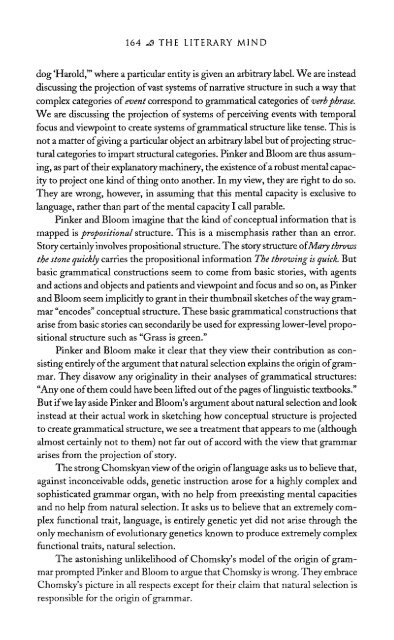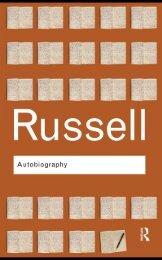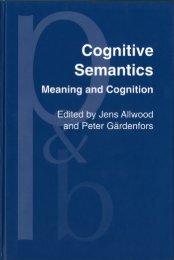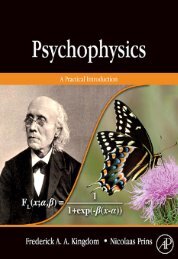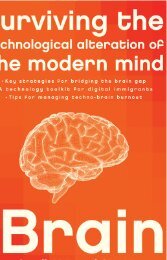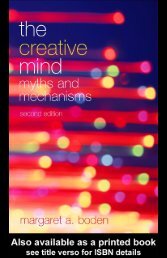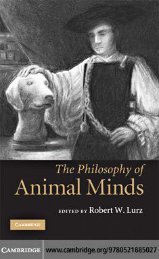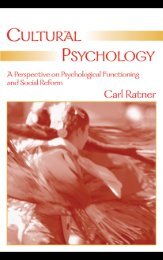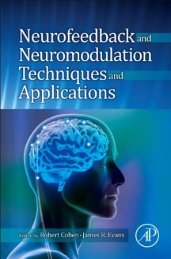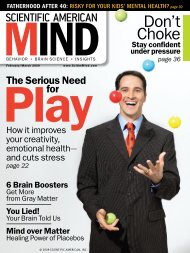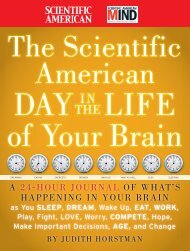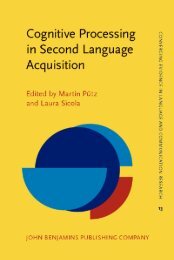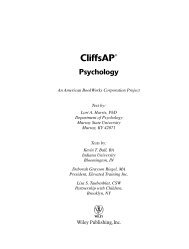The Literary Mind.pdf
The Literary Mind.pdf
The Literary Mind.pdf
You also want an ePaper? Increase the reach of your titles
YUMPU automatically turns print PDFs into web optimized ePapers that Google loves.
164 THE LITERARY MIND<br />
dog 'Harold,'" where a particular entity is given an arbitrary label. We are instead<br />
discussing the projection of vast systems of narrative structure in such a way that<br />
complex categories of event correspond to grammatical categories of verb phrase.<br />
We are discussing the projection of systems of perceiving events with temporal<br />
focus and viewpoint to create systems of grammatical structure like tense. This is<br />
not a matter of giving a particular object an arbitrary label but of projecting structural<br />
categories to impart structural categories. Pinker and Bloom are thus assuming,<br />
as part of their explanatory machinery, the existence of a robust mental capacity<br />
to project one kind of thing onto another. In my view, they are right to do so.<br />
<strong>The</strong>y are wrong, however, in assuming that this mental capacity is exclusive to<br />
language, rather than part of the mental capacity I call parable.<br />
Pinker and Bloom imagine that the kind of conceptual information that is<br />
mapped is propositional structure. This is a misemphasis rather than an error.<br />
Story certainly involves propositional structure. <strong>The</strong> story structure of Mary throws<br />
the stone quickly carries the propositional information <strong>The</strong> throwing is quick. But<br />
basic grammatical constructions seem to come from basic stories, with agents<br />
and actions and objects and patients and viewpoint and focus and so on, as Pinker<br />
and Bloom seem implicitly to grant in their thumbnail sketches of the way grammar<br />
"encodes" conceptual structure. <strong>The</strong>se basic grammatical constructions that<br />
arise from basic stories can secondarily be used for expressing lower-level propositional<br />
structure such as "Grass is green."<br />
Pinker and Bloom make it clear that they view their contribution as consisting<br />
entirely of the argument that natural selection explains the origin of grammar.<br />
<strong>The</strong>y disavow any originality in their analyses of grammatical structures:<br />
"Any one of them could have been lifted out of the pages of linguistic textbooks."<br />
But if we lay aside Pinker and Bloom's argument about natural selection and look<br />
instead at their actual work in sketching how conceptual structure is projected<br />
to create grammatical structure, we see a treatment that appears to me (although<br />
almost certainly not to them) not far out of accord with the view that grammar<br />
arises from the projection of story.<br />
<strong>The</strong> strong Chomskyan view of the origin of language asks us to believe that,<br />
against inconceivable odds, genetic instruction arose for a highly complex and<br />
sophisticated grammar organ, with no help from preexisting mental capacities<br />
and no help from natural selection. It asks us to believe that an extremely complex<br />
functional trait, language, is entirely genetic yet did not arise through the<br />
only mechanism of evolutionary genetics known to produce extremely complex<br />
functional traits, natural selection.<br />
<strong>The</strong> astonishing unlikelihood of Chomsky's model of the origin of grammar<br />
prompted Pinker and Bloom to argue that Chomsky is wrong. <strong>The</strong>y embrace<br />
Chomsky's picture in all respects except for their claim that natural selection is<br />
responsible for the origin of grammar.


